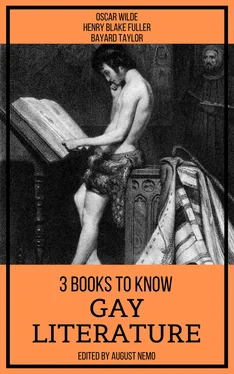He sighed, and, having poured himself out some tea, opened Lord Henry’s note. It was simply to say that he sent him round the evening paper, and a book that might interest him, and that he would be at the club at eight-fifteen. He opened The St. James’s languidly, and looked through it. A red pencil-mark on the fifth page caught his eye. It drew attention to the following paragraph:—
“Inquest on an Actress. — An inquest was held this morning at the Bell Tavern, Hoxton Road, by Mr. Danby, the District Coroner, on the body of Sibyl Vane, a young actress recently engaged at the Royal Theatre, Holborn. A verdict of death by misadventure was returned. Considerable sympathy was expressed for the mother of the deceased, who was greatly affected during the giving of her own evidence, and that of Dr. Birrell, who had made the post-mortem examination of the deceased.”
He frowned, and, tearing the paper in two, went across the room and flung the pieces away. How ugly it all was! And how horribly real ugliness made things! He felt a little annoyed with Lord Henry for having sent him the report. And it was certainly stupid of him to have marked it with red pencil. Victor might have read it. The man knew more than enough English for that.
Perhaps he had read it, and had begun to suspect something. And, yet, what did it matter? What had Dorian Gray to do with Sibyl Vane’s death? There was nothing to fear. Dorian Gray had not killed her.
His eye fell on the yellow book that Lord Henry had sent him. What was it, he wondered. He went towards the little pearl-coloured octagonal stand, that had always looked to him like the work of some strange Egyptian bees that wrought in silver, and taking up the volume, flung himself into an arm-chair, and began to turn over the leaves. After a few minutes he became absorbed. It was the strangest book that he had ever read. It seemed to him that in exquisite raiment, and to the delicate sound of flutes, the sins of the world were passing in dumb show before him. Things that he had dimly dreamed of were suddenly made real to him. Things of which he had never dreamed were gradually revealed.
It was a novel without a plot, and with only one character, being, indeed, simply a psychological study of a certain young Parisian, who spent his life trying to realise in the nineteenth century all the passions and modes of thought that belonged to every century except his own, and to sum up, as it were, in himself the various moods through which the world-spirit had ever passed, loving for their mere artificiality those renunciations that men have unwisely called virtue, as much as those natural rebellions that wise men still call sin. The style in which it was written was that curious jewelled style, vivid and obscure at once, full of argot and of archaisms, of technical expressions and of elaborate paraphrases, that characterises the work of some of the finest artists of the French school of Symbolistes. There were in it metaphors as monstrous as orchids, and as subtle in colour. The life of the senses was described in the terms of mystical philosophy. One hardly knew at times whether one was reading the spiritual ecstasies of some mediæval saint or the morbid confessions of a modern sinner. It was a poisonous book. The heavy odour of incense seemed to cling about its pages and to trouble the brain. The mere cadence of the sentences, the subtle monotony of their music, so full as it was of complex refrains and movements elaborately repeated, produced in the mind of the lad, as he passed from chapter to chapter, a form of reverie, a malady of dreaming, that made him unconscious of the falling day and creeping shadows.
Cloudless, and pierced by one solitary star, a copper-green sky gleamed through the windows. He read on by its wan light till he could read no more. Then, after his valet had reminded him several times of the lateness of the hour, he got up, and, going into the next room, placed the book on the little Florentine table that always stood at his bedside, and began to dress for dinner.
It was almost nine o’clock before he reached the club, where he found Lord Henry sitting alone, in the morning-room, looking very much bored.
“I am so sorry, Harry,” he cried, “but really it is entirely your fault. That book you sent me so fascinated me that I forgot how the time was going.”
“Yes: I thought you would like it,” replied his host, rising from his chair.
“I didn’t say I liked it, Harry. I said it fascinated me. There is a great difference.”
“Ah, you have discovered that?” murmured Lord Henry. And they passed into the dining-room.
––––––––

For years, Dorian Gray could not free himself from the influence of this book. Or perhaps it would be more accurate to say that he never sought to free himself from it. He procured from Paris no less than nine large-paper copies of the first edition, and had them bound in different colours, so that they might suit his various moods and the changing fancies of a nature over which he seemed, at times, to have almost entirely lost control. The hero, the wonderful young Parisian, in whom the romantic and the scientific temperaments were so strangely blended, became to him a kind of prefiguring type of himself. And, indeed, the whole book seemed to him to contain the story of his own life, written before he had lived it.
In one point he was more fortunate than the novel’s fantastic hero. He never knew — never, indeed, had any cause to know — that somewhat grotesque dread of mirrors, and polished metal surfaces, and still water, which came upon the young Parisian so early in his life, and was occasioned by the sudden decay of a beauty that had once, apparently, been so remarkable. It was with an almost cruel joy — and perhaps in nearly every joy, as certainly in every pleasure, cruelty has its place — that he used to read the latter part of the book, with its really tragic, if somewhat over-emphasised, account of the sorrow and despair of one who had himself lost what in others, and in the world, he had most dearly valued.
For the wonderful beauty that had so fascinated Basil Hallward, and many others besides him, seemed never to leave him. Even those who had heard the most evil things against him, and from time to time strange rumours about his mode of life crept through London and became the chatter of the clubs, could not believe anything to his dishonour when they saw him. He had always the look of one who had kept himself unspotted from the world. Men who talked grossly became silent when Dorian Gray entered the room. There was something in the purity of his face that rebuked them. His mere presence seemed to recall to them the memory of the innocence that they had tarnished. They wondered how one so charming and graceful as he was could have escaped the stain of an age that was at once sordid and sensual.
Often, on returning home from one of those mysterious and prolonged absences that gave rise to such strange conjecture among those who were his friends, or thought that they were so, he himself would creep upstairs to the locked room, open the door with the key that never left him now, and stand, with a mirror, in front of the portrait that Basil Hallward had painted of him, looking now at the evil and ageing face on the canvas, and now at the fair young face that laughed back at him from the polished glass. The very sharpness of the contrast used to quicken his sense of pleasure. He grew more and more enamoured of his own beauty, more and more interested in the corruption of his own soul. He would examine with minute care, and sometimes with a monstrous and terrible delight, the hideous lines that seared the wrinkling forehead, or crawled around the heavy sensual mouth, wondering sometimes which were the more horrible, the signs of sin or the signs of age. He would place his white hands beside the coarse bloated hands of the picture, and smile. He mocked the misshapen body and the failing limbs.
Читать дальше













